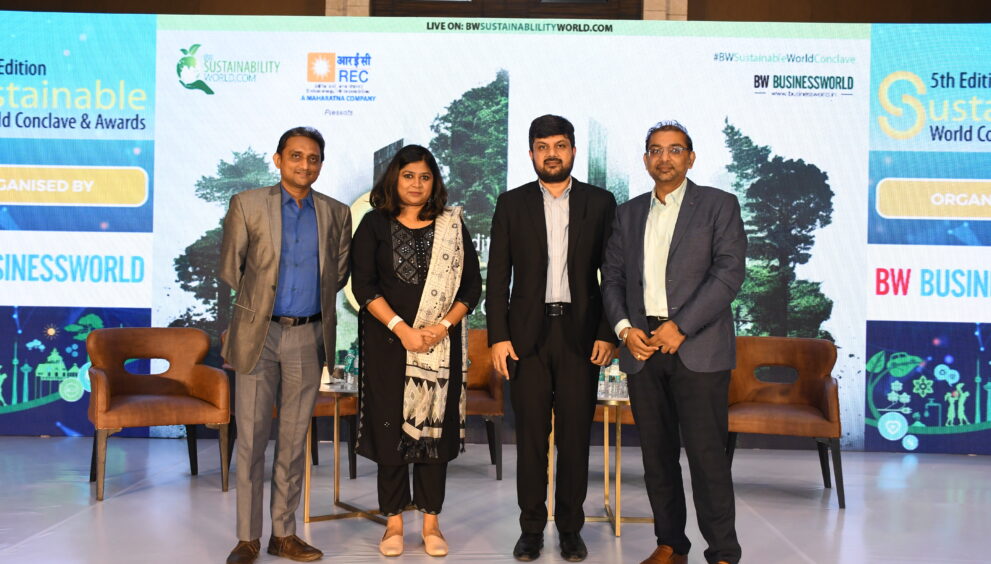Corporate Visionaries Unveil The Synergy Of Sustainability And Profitability

Navigating the green frontier, industry leaders illuminate strategies for a profitable and sustainable corporate future
In a recent discussion panel focusing on the theme “Sustainability with Profitability: Doing Good is Good Business,” industry leaders provided insights into the dynamic relationship between sustainability and profitability within corporate India. Anjalli Ravi Kumar, Chief Sustainability Officer at Zomato; Aun Abdullah, Head-ESG at Lodha; Pawan Verma, Head of Purchases and Executive Sponsor for Environmental Sustainability at P&G India; and Abhishek Ranjan, Senior Director & Global Head of ESG and Sustainability at Brillio Technologies and Managing Trustee of Brillio Foundation, discussed their organizations’ endeavours and the associated challenges. The discourse delved into topics such as cost sharing, corporate greenwashing and the imperative for transparency.
Regarding environmental sustainability, Abdullah highlighted Lodha’s proactive role in sustainable practices within the real estate sector. He emphasized, “Our sustainability strategy has 2 pillars – decarbonization and resilience, and it all comes from bringing climate risk as a central issue.” Abdullah underscored the role of urbanization in driving economic growth, labelling it as “Amritkaal,” given India’s significant contribution to global growth.
Abdullah emphasized the significance of real estate development as the industry is the second-largest employment provider in India after agriculture, asserting that the sector’s growth should not be restricted.
Addressing concerns about pollution from large developers, Abdullah outlined Lodha Group’s focus on integrated developments, bringing residences and offices under one roof to reduce travel and optimize energy consumption.
Discussing EV charging stations, Abdullah disclosed that Lodha has over 100,000 charging stations across its projects, available to the public at no charge for added convenience.
Regarding financing sustainable practices, Ranjan referred to a Wall Street Journal article indicating a decline of USD 14 billion in ESG fund investments. He posed a question to the forum, “Who is actually bearing the cost of sustainability and ESG?” Ranjan argued that passing the additional cost of sustainability to end consumers is not the correct approach and discussed the potential introduction of a carbon tax.
Driving the conversation on “doing good is good business,” Verma of P&G India emphasized, “Sustainability is not just nice-to-have, it is a must-have.” He highlighted the evolving consumer landscape, policymaker influence, and the startup ecosystem, making sustainability practices imperative and more accessible for corporates.
On the topic of ‘plastic waste management,’ Verma explained how P&G exceeds extended producer responsibility guidelines and is creating infrastructure for recycling and upcycling recovered plastic.
Sharing insights from Zomato, Kumar stated, “Sustainability is one of the ingredients of how we’ve become profitable.” Zomato’s ‘climate-conscious delivery’ program faced challenges, such as financial accessibility for delivery partners to afford EVs. Zomato addressed this by building an EV ecosystem, with 1 out of 5 deliveries in Delhi and Bengaluru now being EV-based.
The panel also delved into greenwashing, emphasizing transparency as crucial for building trust with stakeholders. Kumar stressed the importance of honesty about achievements and challenges, including efforts to address low women representation in their warehouses.
Ranjan expressed views on greenwashing, noting that corporates are under constant scrutiny on social media and addressed the audience as silent stakeholders in his company.
Highlighting the importance of transparency, Verma stated, “We may not have all the answers right now, but we are willing to be agile and recognize the change.”
The panel discussion underscored the evolving sustainability landscape in corporate India. Despite existing challenges, speakers showcased initiatives and strategies aligning profitability with responsible and transparent business practices. As the nation undergoes rapid development, the commitment to sustainability emerges as a critical factor in shaping a greener and more prosperous future.






































































































































































































































































































































































































































































































































































































































































































































































































































































































































































































































































































































































































